Nasser was a leaders that defined a generation in the Arab World, with the Cold War so starkly divided between the dual forces of communism and capitalism, it’s easy to forget that there were many other competing, often regional ideologies that fought their own wars for dominance and perhaps at one point played a significant role in the lives of millions.
If you’re from the west or even the east, there’s a good chance you don’t know much about Nasserism. What even is it? Who the hell is Nasser? Well, here’s a quick primer to one of the most significant figures in of the 20th century.
And one of course has to wonder what a modern Nasser would make of the recent Arab-Israeli conflict….
Table of Contents
- Context of Egypt
- Egypt’s ‘Independence’
- 1948 War in Palestine
- Collapse of the Kingdom of Egypt
- Gamal Abdel Nasser
- The Rise of Nasser
- Nasser’s Early Leadership
- Suez Crisis
- Nasser’s Influence Grows
- The Six Day War
- Nasser Dies
Context of Egypt
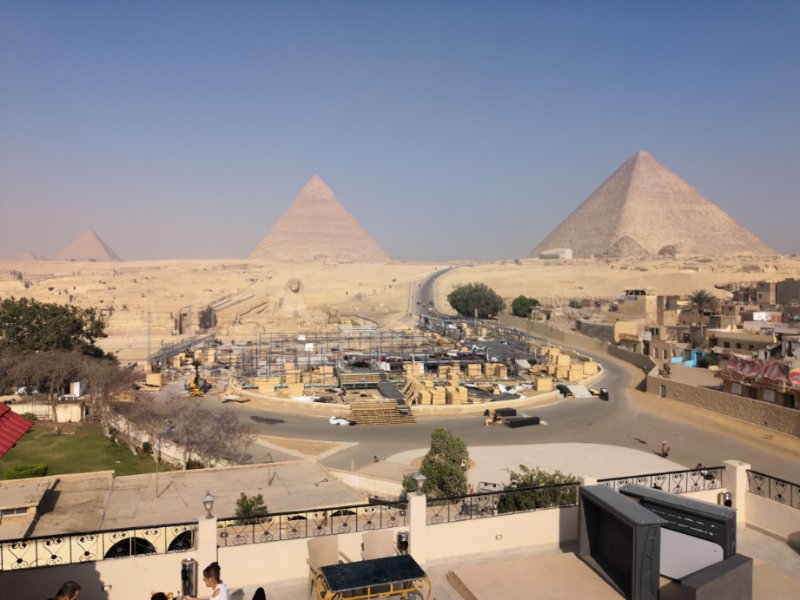
To understand Gamal Abdel Nasser, we need to understand where he came from as well as what he was all about. You see, Nasser was born in Egypt on the 15th of January in 1918, which wasn’t a great time for the wider Arab or African world. Colonialism from Europe was reaching new levels as the end of WW1 saw the collapse of the Ottoman Empire. Egypt had been in a rather awkward position for decades. It had been an Ottoman tributary state, but largely managed its affairs independently.
Following the Anglo-Egyptian war of 1882, Egypt was also occupied by a fairly sizable contingent of British soldiers. Despite this military occupation, the British never officially declared a protectorate and it was technically still part of the Ottoman empire. Both empires were reluctant to press too hard and risk conflict with each-other, with Britain mostly wishing to maintain the interests of its businessmen based in Egypt at the time and direct the country towards capital gain.
WW1 changed this. As Britain and the Ottoman Empire entered into open warfare, Britain moved to formally establish a protectorate of Egypt, leading to the ‘Sultanate of Egypt’, which was in many ways a puppet government for British interests. This protectorate was in place to the end of the war and saw mass abuses, then when the war was over… This continued. Which did not make the Egyptians very happy. It was this environment that Nasser was born into, with resentment bubbling through his infancy and bursting into the Egyptian revolution of 1919. (Though it had in fact begun in November of 1918.)
Egypt’s ‘Independence’

In 1922, Britain partially relented and recognized limited independence of Egypt. This marked the Kingdom of Egypt, which many Egyptians really saw as a continuation of European domination, which likewise had taken a stranglehold over the rest of the Arab world. The 1924, parliamentary elections saw the overwhelming success of the Wafd Party, an Egyptian nationalist movement that was to become the third most powerful force in the country, directly behind the king and Britain. Ultimately, they were to win 179 of 211 seats. While the party represented the popular will of the Egyptian people for a time, this was not to last. The Anglo-Egyptian treaty of 1936 saw the withdrawal of British troops from all but the Suez Canal and this was supported by the Wafd party. As much as this was an improvement, it still left political control in British hands and led to further Egyptian unrest.
Tensions increased further as Britain entered the second world war and Egypt became a front of the conflict. Many Arabs felt a private sympathy for the Axis forces, simply in the hopes that they could provide some level of independence for them. British fears of Axis sympathies within the Egyptian royalty led to a most unusual alliance, with the British insisting that King Farouk allow the Wafd into government on the basis that their grassroots support would be a useful ally in the war effort. His resistance led to the Abdeen Palace incident of 1942, in which British troops surrounded the king’s palace and forced an ultimatum of either accepting the Wafd government or abdicating. He capitulated, causing a national humiliation and further alienating popular support for both the Wafd party and the British.
1948 War in Palestine

As you may know, the Holocaust was perhaps the most brutal and savage event of the 20th century and likely much further back than that. The aftermath saw millions of Jewish people dead, with millions more without homes or any feeling of security. Their neighbors had ratted them out in many cases, how could they return to their homes in an anti-Semitic Europe and hope to be safe? Given Britain’s control of vast portions of the Middle East, a plan was set in motion which was itself, brutal and unfair.
The British mandate of Palestine was to be abandoned and replaced with a partition state split between Palestinians and Jews (who were to become Israelis). In the initial UN partition plan, the Arab state was to comprise 43% of Mandatory Palestine while the Jewish state was to receive the rest, despite being a third of the population of mandatory Palestine at that time. This was justified due to the expected mass immigration of European Jews. Palestinians were largely ignored in negotiations on the matter and during this time, Jewish territorial control was modified to 61%, a grim sign for what was to come.
Egypt passionately spoke out in opposition of the plan, seeing it as putting millions of Palestinian lives at risk as they would have been forced out of their homes against their will and almost inevitably spark a civil war. Arab states, as a united block, walked out of the chamber after the vote approving the plan on the 29th of November 1947. Protests in Palestine began the very next day and on the 1st of December, a three-day Arab general strike began. Tit-for-tat mass killings soon began, with the British army forced to intervene on what was fast becoming a civil war.
As the conflict spiraled, America dropped their support for the partition plan, raising Arab hopes for an end to the planned partition of their nation. Mass violence from both sides sparked an exodus from both communities, permanently fracturing them, only getting worse as foreign powers funded whichever groups they supported.
On the 14th of May, the British forces had finally been withdrawn and the State of Israel was officially declared in what was now formally British Mandatory Palestine. In response, four Arab League nations simultaneously launched an invasion to restore Palestinian control. These were Iraq, Transjordan, Syria and of course, Egypt, which by this point was at least independent enough to prepare their own military operations. The issue is… The Arab forces were terribly prepared. Their weapons were poor, they lacked even basic maps and they failed to co-operate while the Jewish forces were given massive aid from numerous countries that ensured their military superiority.
Due to the circumstances of the war, the UN agreement was effectively scrapped by the Israeli forces who saw an opportunity for an overwhelming military success. Palestinians were driven from their homes and a mass exodus began, with many fleeing to neighboring Arab countries including Egypt. When the UN proposed a renewed partition plan, both sides rejected it, now seeing utter victory or defeat as the only solutions. On the 6th of January 1949, after massive military failures, Egypt announced its willingness to negotiate a peace settlement with Israel.
Collapse of the Kingdom of Egypt
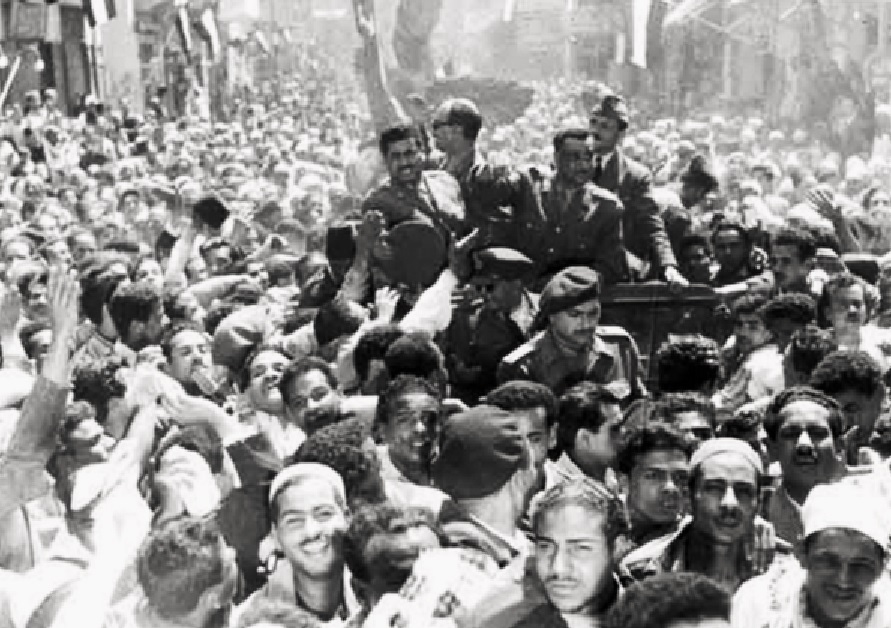
Egypt’s agreement with Israel was received with shock and horror by Arabs and Palestinians in particular. The new partition plan rewarded Israel with 78% of Palestinian territory, a fully 22% more than the original plan. To facilitate this, Israel forced Palestinians out of their towns and villages in what was known as the Nakba, with over 700,000 forced to flee into refugee camps. Subsequent anger in Arab territory led to a similar number of Jews fleeing to Israel over the following three years, being housed in formerly Palestinian homes. The failure was a catastrophic setback for Egyptian national ambitions and pride, something that was to filter greatly into Nasserism over the coming years.
Frustration and anger had been forming among the Egyptian populace for years now and the catastrophic defeat in Palestine brought this to new heights. Not just among the civilians of Egypt, but the military as well. After all, they had bore the brunt of the humiliation during the war, many blaming both Britain and the Egyptian king. To try and remedy this, Egypt withdrew the Anglo-Egyptian agreement in 1951, now being led by a renewed Wafd government. Egypt demanded the removal of British forces from the Suez Canal, which was… Not looked upon well by the Brits. In response, Egypt cut off their water and encouraged local police forces to arm insurgents against them. On the 25th of January, the British surrounded a police station and demanded that all arms be surrendered. When the interior minister was called and asked what to do, he demanded that the police fight to the last man. 43 Egyptian police officers were killed, and the station was leveled.
The following day was known as ‘Black Saturday’, in which spontaneous mass anti-British riots began in Cairo, destroying up to 750 buildings. The security forces were mysteriously absent, reflecting growing military discontent with the Egyptian government. At this stage, many already saw the Kingdom of Egypt as lost, with the Wafd government disbanded by King Farouq. It was only a matter of time before its eventual collapse outright.
On the 22nd of July 1952, a group of Egyptian military officers began rounding up key royalist commanders and ordered the soldiers in their barracks to take control of the Military General Headquarters, beheading the remaining royalists in the military. By 6am on the 23rd, the newly commanded air-force had begun patrolling the skies of Cairo to ensure the transfer of power went smoothly. At 7:30am, a broadcasting station officially announced a military coup by the Free Officers Movement, causing King Farouq to flee in a panic. Ultimately, the king was forced to abdicate in favour of his son Ahmed Fuad… Who was a baby at the time. Farouq was forced into exile in Italy and a new government was formed with a more powerful president in charge, lessening the power of the King, who wouldn’t be in any position to make decisions anyway for at least a decade or so. On the 28th of July 1952, Muhammad Naguib became the first leader of a truly independent Egypt. At his right-hand was the deputy premier, none other than Gamal Abdel Nasser.
Gamal Abdel Nasser
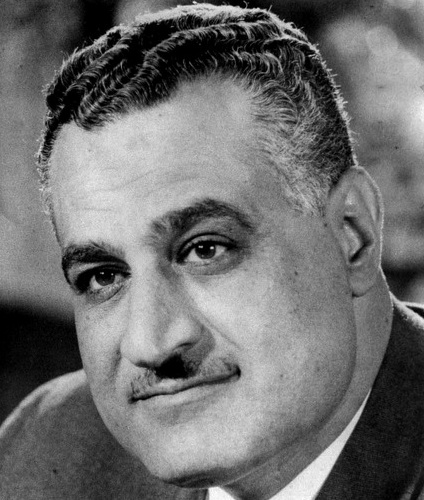
So that was a long fucking story to finally get to the man himself. Nasser had been in the background for much of these events. Indeed, he didn’t even become president! He was part of the government sure, but at least at this stage, he wasn’t quite so important. It’s perhaps important to discuss his personal history leading up to this point first.
Nasser’s first real political involvement was in 1934, at the age of 16 when he joined the Young Egypt Party, a radical nationalist and largely fascist organization that violently wished to overthrow British rule and establish an Egyptian empire. The party engaged in pitched street battles with police and the Wafd party, seeing them as capitulating to the British and unworthy of leading the nation. In 1938, this group was forced to disband which led Nasser to seek political aspirations elsewhere, though his time had imbued him with a powerful sense of nationalism.
On the 13th of November 1935, Nasser led a student protest against the British which resulted in them opening fire, with a bullet grazing his head and killing several students. Nasser was first publicly mentioned at this time in the newspapers as the leader of the protest, establishing the first semblance of political prestige for him.
During his early life, Nasser traveled frequently despite his rather lowly economic status. This experience allowed him to see the best and worst of Egyptian society, leading to a bitter hatred of the corruption and extravagance of the Egyptian elite. While hardly a communist, there was a left-wing inclination to Nasser’s politics and a desire to raise the station of all Egyptian people, who he felt were being crushed under the weight of an oppressive native class as well as foreign imperialism. In 1937, he was able to join the Royal Military Academy. It was here that many key allies in the Free Officer’s Movement were first met. Nasser was to emerge as the leader of this clique.
In 1948, Nasser participated in the Arab-Israeli war, becoming something of a war hero for surviving encirclement by Israeli forces and refusing to surrender against their bombardment. Nasser noted the army’s utter lack of preparation for the conflict and deepened his disgust against the failing Egyptian kingdom. In the following year, after his return to Egypt, the Free Officer’s Movement was officially founded, and revolutionary sentiment was developed within. The movement contained a wide variety of representation, from communists to aristocracy and even the Muslim Brotherhood. Nasser was elected as chairman of the movement.
For some time, Nasser prepared for the coming revolution. Recruitment stepped up and one attempted assassination was carried out, though its result of wounding an innocent woman reportedly haunted Nasser and dissuaded him from such action in the future. As Egypt approached conditions necessary for a popular revolt, Nasser recognized that his relatively lowly status as a lieutenant colonel would leave him unacceptable to many Egyptians as a national leader. For this reason, General Naguib was selected to act as the movement’s figurehead instead. As for the coup… Well, that’s already been covered.
The Rise of Nasser
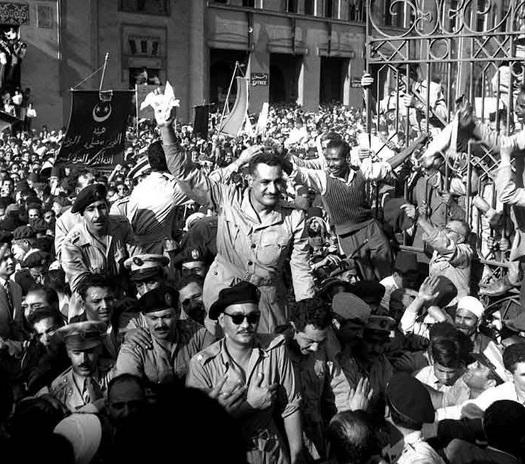
The first major action of the post-coup government was on September 9th, in which an agrarian land reform law immediately seized all European-owned land and subsequently redistributed it to Egyptians. On the 16th of January 1953, parties were officially banned, and a three-year ‘transitional’ period was announced in which the Revolutionary Command Council (primarily composed of Free Officer’s Movement members) would run the country directly. A new constitution was declared on the 10th of February, with the new constitution being overtly secular, which estranged the Muslim Brotherhood faction of the new government. Street battles soon began and eventually, the Muslim Brotherhood was outlawed outright in 1954. On the 18th of June 1953, a republic was officially declared with the monarchy disbanded.
Initially, Nasser was only second in government to Naguib, but what followed was a massive factional conflict which saw resignations, arrests, reinstatements, mass rallies both for and against Nasser and Naguib, at last eventually ending with Nasser taking his place as the primary leader of the new Egyptian state. To be frank, the utter chaos of these few months are worth their own article.
On the 19th of October, Nasser secured an agreement with Britain for the final withdrawal of troops from the Suez Canal within 20 months, at last ending British occupation of Egypt. Nasser delivered a speech on the 26th of October to celebrate this success and was targeted by an assassin from the Muslim Brotherhood who fired eight shots and missed all of them. Nasser stoically appealed for calm and delivered a passionate speech that was to set alight the hearts of Egyptians.
“My countrymen, my blood spills for you and for Egypt. I will live for your sake and die for the sake of your freedom and honor. Let them kill me; it does not concern me so long as I have instilled pride, honor, and freedom in you. If Gamal Abdel Nasser should die, each of you shall be Gamal Abdel Nasser … Gamal Abdel Nasser is of you and from you and he is willing to sacrifice his life for the nation.”
Gamal Abdel Nasser, 26th October 1953
The response was ecstatic, and Nasser’s status grew immensely. The attack justified another mass crackdown on opposition which left Nasser as the undisputed leader of Egypt. To boost his popularity, Nasser began a series of cross-country tours where he delivered passionate speeches, invoking ideals of the collective Arab people and nationhood. This was to be the seeds of Nasserist ideology. In January of 1955, Nasser was officially appointed president, ending all dispute of who was in charge of the nation.
Nasser’s Early Leadership
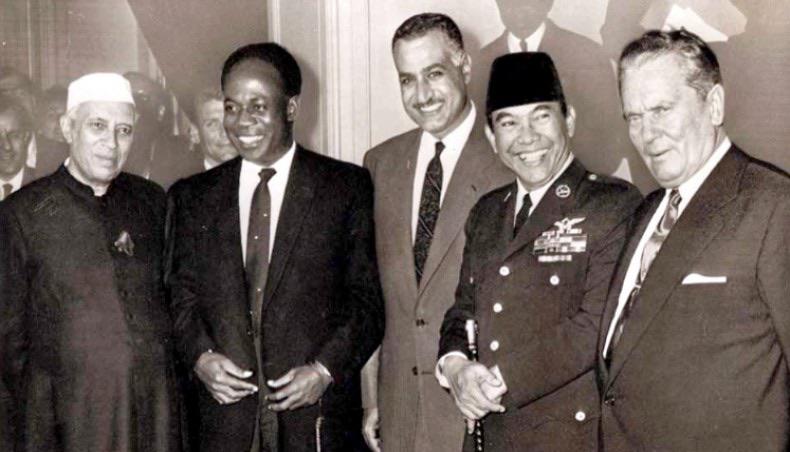
An immediate threat to Nasser’s authority was, of course, Israel. The Gaza Strip had a border with the nation and the Egyptian army was in no position to defend it. An Israeli attack on the strip was faced with no response from Egypt, allowing them to attack Palestinian insurgents. This was a slap in the face for Nasser’s authority, but would be nothing compared to what a military provocation would bring upon him. The Egyptian army was no more ready now than it had been in 1948. For this reason, Nasser sought the reorganization of the Egyptian military. As Western nations were unwilling to help, he turned his attention to the eastern bloc and secured an $83 million arms deal with the Socialist Republic of Czechoslovakia. The west was shocked to learn that Egypt had armed itself so successfully in secret, with Egypt now poised as the most well-armed nation in the Arab world. Egypt was beginning to position itself, as it always hoped, as the center of a wider Arab movement.
Between the 18th and 24th of April 1955, the Afro-Asian Conference (Bandung Conference) was held in Indonesia as a meeting of independent Asian and African states who largely existed outside of the East-West cold war dichotomy. There were several Marxist states in attendance, most notably China and Yugoslavia, however neither were entirely aligned with the USSR at this time. 54% of the Earth’s population at this time was represented at the conference and Egypt presented itself as the key figurehead of the Arab nations in attendance. The conference established the nations as ‘progressively neutral’ with regard to the cold war, with even China announcing its prioritization of national independence over Marxism, with countries free to choose capitalism if they so wished.
Nasser’s prestige both at home and abroad was greatly boosted by his participation, greatly increasing his authority. The so-called ‘progressive neutrality’ was especially influential to Nasserism. In January of the following year, a new constitution was adopted, establishing a one-party leadership under the National Union and a 350-member national assembly. Women’s suffrage was granted, and the Revolutionary Command Council was dissolved. Egypt had established itself as a completely different state than the monarchist corrupt authority that existed before.
With the Suez Canal finally evacuated by British forces, it was decided by the US and UK to snub Nasser by pulling out of a joint agreement to finance the construction of the Aswan Dam in the canal. In response Nasser announced on the 26th of July 1956, the nationalization of the Suez Canal Company in order to fund the dam himself. The result was the further independence of Egypt and the expulsion of the mostly French stakeholders in the company. Thousands of Arabs throughout the Arab world came out onto the streets to support this move, seeing Nasser as a great leader of Arab independence movements everywhere.
Suez Crisis
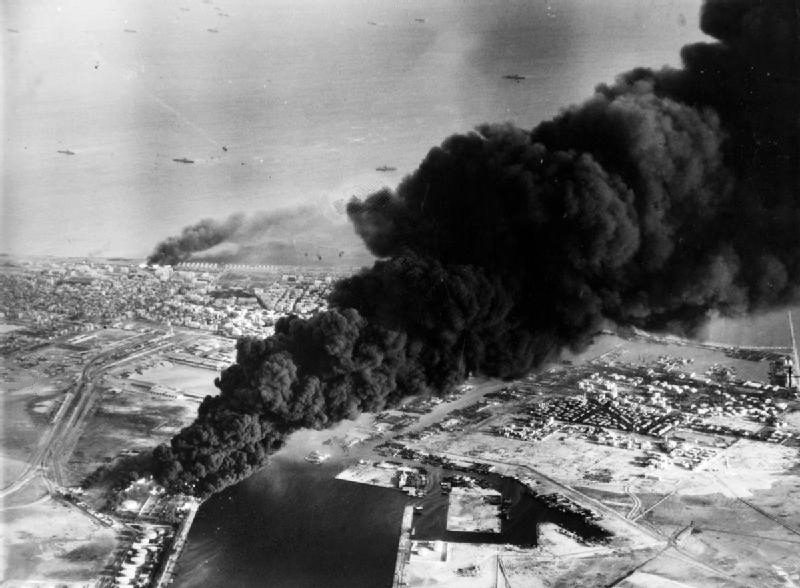
The nationalization of the Suez Canal was… Not very well received by foreign powers, let’s put it that way. France was pissed, Britain was pissed, and Israel was pissed. This led to the fateful decision to invade the Sinai Peninsula and oust Nasser to reassert control and get rid of this upstart who was promoting the rise of a new, anti-western regional power. On October 29th, Israel invaded. On the 5th of November, both Britain and France invaded as well.
The invasion was a crushing military victory for those three powers, who swiftly drove out the Egyptian forces, albeit not before the Egyptians closed the canal, rendering it economically useless to the powers. What’s more, the invasion freaked the hell out of both the USA and USSR. The Soviet premier Nikolai Bulganin threatened outright military strikes on Britain, France and Israel if they continued their aggression, which America suspected could be a prelude to a third world war due to their NATO obligations to respond in kind to the Soviet aggression. For this reason, among others, America turned its back on the three aggressors.
The Arab world commenced an oil embargo on Britain and the US refused to bail them out of it. Mass demonstrations erupted in the UK and parliament nearly came to blows on the matter. After all, this was just days after the Soviet invasion of Hungary. What moral right did Britain have to judge them when they were doing exactly the same kind of thing in Egypt? Militarily, Egypt was helpless but politically, all three aggressors were rapidly losing ground, with President Eisenhower threatening to shut off all economic aid to Israel in what may have been the only case of the US actually punishing Israel for crimes.
On the 6th of November, only a day after the conflict began in earnest, Britain was the first to crack and declared a ceasefire without warning France or Israel. While British and French forces remained for a while longer, their role became defensive until their withdrawal on the 22nd of December, being replaced with UN peacekeepers instead. Israel remained much more belligerent, remaining until March of 1957 and performing a ‘scorched earth’ tactic of destroying and looting everything they could as they made their exit, including numerous civilian villages. A war crime sure, but now that they were gone, the international community didn’t care.
The aftermath for Egypt? It was a startling victory for Nasser. He had faced down three of the world’s biggest powers and won. Britain and France especially had been humiliated, with the British prime minister stepping down not long after the conflict’s end. The Arab world that collectively condemned the invasion now seemed to regard Nasser with awe, achieving that which hardly any other countries could. With some distortion of the facts, even Egypt’s military failures were downplayed, and a swell of national pride allowed Nasser to introduce new powers, mass-arresting opponents and perhaps most worryingly, stripping the rights of many of Egypt’s Jewish citizens. The actions of Israel once again began to be seen as reflecting on the peaceful Jewish people living in the Arab world and this sparked yet another exodus to Israel, furthering a prejudiced belief on the part of many Arabs that their loyalties were to Israel all along.
While Nasser credited Eisenhower with mediating an end to the conflict, the vocal support of the Soviets proved to be an enormous game-changer. Suddenly the third world found a potential military ally in the superpower and while hardly communist, Nasser began to grow closer with the eastern bloc, something that was to become a trend with countries influenced by Nasserism in later years.
Nasser’s Influence Grows
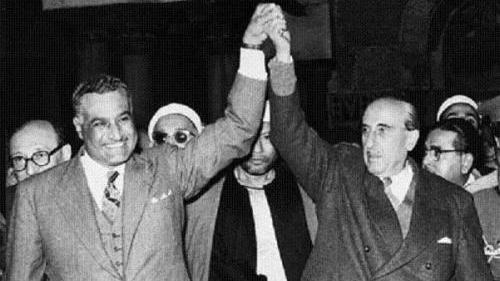
By the end of 1957, Nasser had finished nationalizing industries previously owned by Britain and France, with many more to follow in this nationalization process. This influence was almost certainly taken from the growing links to the eastern bloc, though two thirds of the economy remained largely privately controlled. The dam that the US had refused to aid Nasser with building was instead built with the assistance of the Soviets, further marking their closeness.
Towards the end of that same year, nearby Syria was in a state of crisis. As one of Egypt’s closest allies, it was perhaps natural for Egypt to send a delegation of troops to station in Syria and help to prevent a potential invasion or the threat of outright civil war. In response, Syria began an almost unprecedented request; to form a national merger with Egypt. Even Nasser, famed for his pan-Arab beliefs, balked at this outrageous request… At first. A second request in January of 1958 was received more positively as it was agreed that Nasser would become de-facto president of both countries. On the 1st of February, the United Arab Republic was formed.
As if Nasser’s prestige couldn’t grow any further, it suddenly did. A pan-Arab nation had been a dream for many but thought impossible. Now it was beginning! Before the month was even over, the crown prince of North Yemen had arrived, asking to be included in the union. As it was much further away, this was instead included into a loose federation, known as the United Arab States. It seemed like Nasser’s influence in the Arab world was unstoppable, with only a handful of US-backed states opposing him. Though even then, his popularity endured among their citizens.
On the 14th of July 1958, Iraq’s anti-Nasser government and monarchy were overthrown in a revolt which cleared one of Nasser’s biggest political opponents. He immediately recognized the new government and on the 19th, announced desires for a full Arab union. While the United Arab Republic had come into being almost by accident, Nasser was now hitting the ground running to build it further. While Iraq did not join the union, popular demand for such a union was high in the country.
Nationalization continued throughout the United Arab Republic until on the 28th of September 1961, a coup in Syria overthrew the pro-Nasser government. While mass demonstrations in support of the union broke out and Nasser sent in forces to quell the coup, he changed his mind two days later and instead chose to recognize the new government and recognize Syria’s independence on the 5th of October. While this was a personal major setback for Nasser and he reportedly took it hard, his status in the Arab world remained extremely high.
The following years saw a series of setbacks and steps forward. North Yemen fell to civil war, Algeria became an ally. A Nasserist became president in Egypt, then Ba’athists (a separate pan-Arab movement) took control in Syria, who Nasser denounced as fascists. Nasser established the Palestinian Liberation Organization and once again placed himself as a figurehead of anti-Zionism, but then Ba’athists took over Iraq too. It was hard to get a consistent streak of success. Once major victory came with Nasser being made the second head of the Non-Aligned Movement in 1964, a movement of allied countries outside of the Soviet or American spheres of influence that had been founded by Josip Broz Tito of Yugoslavia.
In 1962, a new constitution was also unveiled, one which guaranteed such things as universal health care, housing and women’s rights. Nasser used his influence on the nation’s religious authorities to ensure such transitions were smooth, going so far as to force authorities to issue a fatwa which declared Shia Muslims, Alawites and Druze were once again part of ‘mainstream Islam’, where prior they had all been denounced as heretics. On the 25th of March 1965, Nasser was voted once again to the position of president in an election with no other candidates. It seemed Nasser’s position was unstoppable… But alas.
The Six Day War
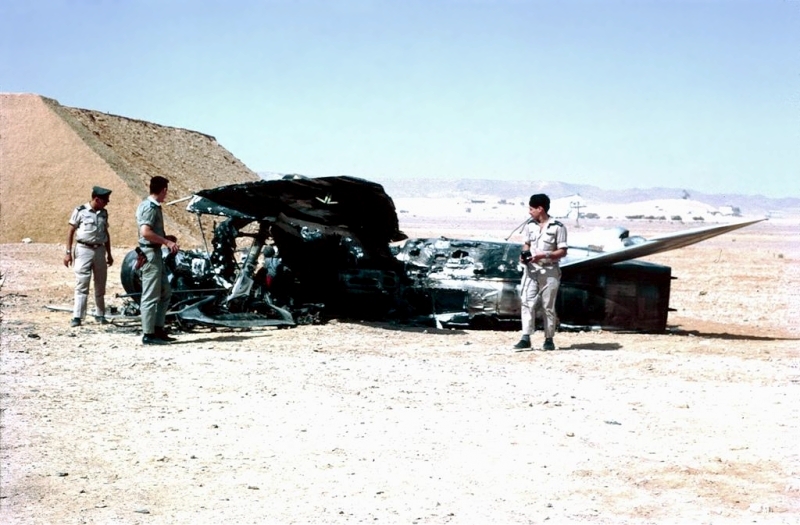
I think you can guess from the name of this war that it wasn’t a particularly long one. Despite that, it was one of the most important conflicts in Arab history, one which stopped Nasser’s influence right in its tracks.
The Soviets contacted Nasser in May of 1967 to inform him that Israel may be preparing to attack Syria. In response, Nasser expelled UN forces from the Sinai Peninsula on the 19th of May and moved his forces in. Israel stated that a closure of the Straits of Tiran there would be considered an act of war. On the 22nd of May, Nasser ignored this warning and closed the straits. This singular action could perhaps be considered one of his greatest mistakes.
Things were quiet… For a while. A defense pact was signed with Jordan and the Iraqi army deployed in preparation for what may occur. At last, on the 5th of June, Israel launched a surprise air attack and almost instantly wiped out around two thirds of the coalition’s combined air fleets. With poor leadership and overwhelming Israeli firepower, Egypt’s land forces were swiftly overrun and were taking dozens of losses for every Israeli killed in response. By the 8th of June, only three days later, the Sinai Peninsula had been seized by Israel, which it this time decided to keep.
With utter destruction imminent, Nasser appeared on TV on the 9th of June to announce Egypt’s defeat, shocking the public who had been fed false information for the prior few days. That very same day, Nasser announced his resignation. In shock and horror, hundreds of thousands poured into the streets to demand he continue as their leader. Nasser reversed his decision the following day. Whether this was a calculated move or a genuine surprise at the loyalty he maintained, we can only speculate.
The war had done for Jewish people and Zionism what the Sinai conflict had done for Arabs and Arab nationalists all those years prior. Israel’s then moribund economy surged both due to renewed international attention which led to investment and tourism, along with oil seized from the Sinai Peninsula, which certainly crushed Egyptian prestige even more. Their folly had only served to rescue their greatest enemy.
With the fiasco of the war done with, Nasser’s prestige waned greatly. He toppled an attempted coup and reconsolidated power, but there was no doubting that his influence had been crushed from its earlier peak. In February of 1968, students began marching in Egypt with demands for political reform, one of the few true public outcries against Nasser’s rule since the mid-50s. Mild restructuring to enhance democracy occurred, but Nasser’s authority remained largely absolute.
Conflict with Israel continued on a much lower scale, often through intermediaries such as the PLO, until an agreed ceasefire on August 7th 1970, after which Nasser ordered the moving of numerous SAM missiles to the border of the ceasefire line. It was inevitable under these conditions that conflict would start up again… It was only a matter of time.
Nasser Dies
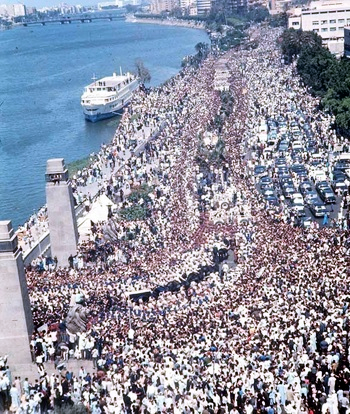
After the conclusion of an Arab League summit on the 28th of September 1970, Nasser suffered a heart-attack. At 6pm of the same day, he passed away at age 52. His death came as an enormous shock as his health situation had been kept a secret from the public, despite two prior heart-attacks in previous years. While it’s true that Nasser’s influence had waned enormously in the previous years, he was still the man who told the Arab people to stand with one voice. He was still the man who dragged Egypt out of its semi-feudal backwater. He was still the man who faced down Britain, France and Israel! It was as if the peak of Nasser’s popularity rose like a phoenix from the ashes in one grand swell.
His funeral procession through Cairo began on the 1st of October and five million mourners formed a ten-kilometer funeral procession. It very may well have been the largest funeral in history. Many foreign diplomats and heads of state attended, with Muammar Gaddafi reportedly fainting twice from sheer emotional distress at the loss of what he saw as such a great inspiration. There was crying in the streets and thousands poured out in cities across the Arab world to march in devotion to their leader, with 75,000 marching through Jerusalem itself. While a united Arab world was never seen, the spiritual unity of millions of Arabs was felt across it on that day.
To this day, Nasser is upheld as an Egyptian hero and an inspiration to countless political movements across the Arab world. While his followers undid many of his political policies and have indeed turned Egypt into a much different place, he remains an enduring figure that stands tall in the hearts and minds of many. Given the context of Egypt before he came along, many may well feel that he gave Egypt its dignity back. While it would be foolish to call him perfect, and indeed he committed many grave mistakes and even sickening crimes, it has to be acknowledged that the world in general would look different without Nasser’s imprint upon it. Whether that would have been a good thing or a bad thing, I leave up to you…
If you are still fascinated about not just the man, but the ideals he stood for, then you’re in luck. Because there’s a part two to this already shockingly long essay! This is the context. What comes next is the ideology of his namesake, Nasserism!





